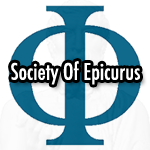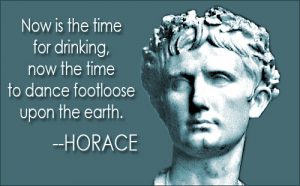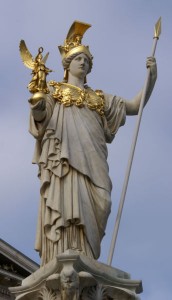“Whereas other pursuits yield their fruit only to those who have practiced them to perfection, in the love and practice of wisdom knowledge is accompanied by delight; for here enjoying comes along with learning, not afterward.” – Epicurus, Vatican Saying 27
One of the issues faced by those interested in Epicureanism, as is the case with any other philosophical or spiritual tradition, is the amount of misinformation and misconceptions that we will encounter when we seek to learn more. The best way to avoid this trap is to consult the source material: the surviving writings of the Epicureans themselves. The overall goal of what follows is to give beginners and more advanced Epicurean aspirants free online access to the writings of the historical Epicureans.
There are 4 direct sources of Epicurean literature accessible to us:
- The surviving letters and maxims of Epicurus (and other Kathegemones).
- The De Rerum Natura of Lucretius
- The Herculaneum Library mostly consisting of the writings of Philodemus
- The wall inscription of Diogenes of Oinoanda
To these sources we can add countless testimonies from antiquity whose reliability is of varying quality. We will divide this overview of Epicurean writings into two parts:
- The Pragmateia: the direct writings of the Epicureans
- Testimonies: indirect writings informing us of the Epicureans, their ideas and their lives from antiquity.
I. THE PRAGMATEIA
The Pragmateia (practices, applications) refers to the foundational writings of the ancient Epicureans, those of the Kathegemones, the four founders of the Epicurean school: Epicurus, Metrodorus, Hermarchus and Polyaenus. These writings were considered authoritative by generations of Epicureans and were read, studied and commented on for many centuries.
The term Pragmateia comes to us from Philodemus. Unfortunately almost all of these writings have been lost through the ages. For example, of the approximately 300 scrolls written by Epicurus, only three letters remain, as well as a certain amount of maxims and quotations from ancient authors. Even less remains from Metrodorus, Hermarchus and Polyaenus. Fortunately, thanks to the writings of Lucretius, the Herculaneum library and the wall inscription of Diogenes of Oinoanda, we can reconstruct a new Pragmateia for those who want to live as Epicureans in the 21st century.
Letters and Maxims
Of the original Pragmateia, three letters survive; the Letter to Herodotus, the Letter to Pythocles and the Letter to Menoeceus. We also have the Kyria Doxai, the Principal Doctrines, which contain 40 maxims summing up Epicurean ethical philosophy. These writings are embedded in Lives and Opinions of Eminent Philosophers of the 3rd century CE biographer Diogenes Laertius. The 10th book of this collection of biographical content, anecdotes and philosophical doctrines is dedicated to Epicurus.
The other direct work that survives from the original Pragmateia is the Epicurean Sayings, more commonly known as the Vatican Sayings because of the fact that it was discovered in a manuscript found in the Vatican Library. The Vatican sayings contain 81 quotes from Epicurus and other Epicureans founders such as Metrodorus, and some of them overlap with the Principal Doctrines. To this we can add Epicurus’ deathbed letter to Idomeneus and Epicurus’ final will, which is important in that it established Epicurean rituals, especially Eikas, the celebration of the Twentieth.
– Ethical writings
The Letter to Menoeceus is probably the easiest introduction to any aspiring Epicurean to the philosophy. It is a short summary of Epicurus’ ethical doctrines and gives a brief outline on the practices to follow in order to live a good life. It deals with subjects such as our attitude towards the divine, the fear of death, pleasure, choices and avoidances, the virtues, and many other topics.
Read Letter to Menoeceus
The next important ethical work is the Principal Doctrines. This list of 40 sayings gives us a general overview of Epicurean ethical doctrines and adds to the content of the Letter to Meoneceus with topics such as friendship, society and justice. It serves as a summary of Epicurus’ ethical system.
Read Principal Doctrines
The founder of the Society of Friends of Epicurus, Hiram Crespo, put together a helpful study guide to the Principal Doctrines here.
Finally we have the Vatican Sayings, which can be seen as complementing the Principal Doctrines with wisdom teachings covering various topics.
Read Vatican Sayings
It is strongly recommended that a student of Epicurean philosophy read these main teachings over and over again. Ideally, Epicurus wanted his followers to learn the content by heart. The more you read their content, which seems simple at first, the more you will discover new layers of meaning you haven’t seen before. And while it is important to also read and study the other Epicurean writings, these are the ones you want to keep returning to and keep close to your heart.
– Letters on Physics
Two letters on Epicurean physics, in other words Epicurus’ view of the universe, have been preserved. While the content of these letters may seem dry and outdated to the modern reader, it is important to keep in mind the purpose of Epicurean scientific inquiry: learn about the world around us to better overcome our fears and understand our place in it. This is the foundation upon which we can confront fears caused by religion, superstition, our mortality, and more. By studying Epicurean physics, we can better grasp the ethics. Once we understand Epicurean physics, we can update many of the ideas: Epicurean theories of natural selection can be replaced by Darwin’s theory of evolution, ancient atomism can be replaced by the Standard Model of particle physics, old theories of the soul can be replaced by neuroscience, and so on.
The first and most important of these writings is the Letter to Herodotus, a general introduction and summary of Epicurean physics.
Read the Letter to Herodotus
The second writing is the Letter to Pythocles, which introduces us to the Method of Multiple Explanations, an Epicurean method which consists in accepting multiple hypotheses as possible when confronted with an unexplained phenomenon rather than settling on a single explanation.
Read the Letter to Pythocles
Society of Friends of Epicurus founder Hiram Crespo elaborates on the Method of Multiple Explanations here.
For the real nerds among us, watch scholar Voula Tsouna’s presentation on the subject here.
– Epicurus’ Legacy
On his deathbed, Epicurus wrote this letter to his friend Idomeneus:
“On this blissful day, which is also the last of my life, I write this to you. My continual sufferings from strangury and dysentery are so great that nothing could increase them; but I set above them all the gladness of mind at the memory of our past conversations. But I would have you, as becomes your lifelong attitude to me and to philosophy, watch over the children of Metrodorus.”
In this letter we see Epicurus’ gratitude towards his friends but also his devotion towards his community, in this case the children of his dead friend Metrodorus.
The other important document preserved is Epicurus’ Last Will, which is relevant to us because it mentions ritual celebrations that would define the identity of the Epicurean community: the celebration of Epicurus’ birthday, funerary rituals for his family, a day dedicated to his brothers, another day dedicated to his friend Polyaenus and most importantly, the celebration on the 20th of every month dedicated to Epicurus and his best friend Metrodorus known as Eikas and practiced by many Epicureans today.
Read Epicurus’ Last Will
De Rerum Natura by Lucretius
Lucretius was a Roman Poet from the 1st century BCE and a follower of Epicurean philosophy. Almost nothing is known about his life other than the fact that he wrote the Latin poem of six parts in Homeric verse known as De Rerum Natura, On the Nature of Things. The reason for writing this text in poetic verse was to give an esthetic appeal to what could otherwise be a dry subject: Epicurean physics. The artistic value of the text led to it being preserved throughout the Medieval period and rediscovered during the Renaissance.
Even though De Rerum Natura focuses on ancient atomistic theories (and can complement Epicurus’ Letters to Herodotus and Pythocles), there are many references to existential and ethical topics such as free will, the fear of death, the blinding nature of love, lust for power, the simple life, the social contract, religion and much more.
There are multiple translations of Lucretius in English and many of the ones you will find online are very old and hard to read for a modern audience. For this reason we recommend these two modern translations here and here.
Also, we recommend you consult this helpful study guide of De Rerum Natura put together by Hiram Crespo here.
Philodemus and the Herculaneum Library
The Herculaneum library was discovered in the ruins of the ancient city of Herculaneum which had been destroyed by the eruption of Mt Vesuvius in 79 CE, the same disaster that devastated Pompeii. This library was part of a villa which belonged to Piso, the father-in-law of Julius Caesar, who was a patron of the 1st century BCE Epicurean philosopher Philodemus. The contents of the library, over 1,800 papyrus scrolls, were carbonized due to the heat of the eruption, which at the same time paradoxically preserved them, even if in poor condition and therefore hard to unroll and decipher. However, thanks to modern imaging technology, it has become easier to decipher and reconstruct much of the content of the scrolls, leading to new research and publication of Epicurean content which has revolutionized our understanding of Epicurean philosophy. Most of the surviving writings belong to the 1st century BCE philosopher Philodemus.
While it is impossible to find much of the writings of Philodemus online, Hiram Crespo wrote summaries of many of his surviving works.
Read the summaries of the Herculaneum Library
We also recommend this introduction to Philodemus and his ideas by scholar Sonya Wurster and an article she wrote about how the discovery of the Herculaneum Library changed our understanding of Epicurean philosophy.
Those who wish to explore further can read the following ethical works of Philodemus published by the Society of Biblical Literature: On Frank Criticism, On Death, On Property Management and On Anger. Published by Bibliopolis: On Choices and Avoidances and On Methods of Inference. Also consult The Ethics of Philodemus by scholar Voula Tsouna, published by Oxford University Press. You can read a review of this last book by Hiram Crespo here:
Diogenes of Oinoanda’s wall inscription
An Epicurean wall inscription was built by Diogenes of Oinoanda, a wealthy philanthropist from the city of Oinoanda, province of Lycia (today Turkey), then part of the Roman Empire. It is believed that the construction of the wall dates back to the 2nd century CE. On this wall, located in the portico of the ancient city, are engraved several Epicurean philosophical texts. While the fragments of these texts were fragmentary, much of its content has been reconstructed by the efforts of scholars.
Diogenes of Oinoanda’s wall inscription was published by Bibliopolis (under the titles The Epicurean Inscription and Supplement to Diogenes of Oinoanda The Epicurean Inscription), but is quite pricey. However, you can read a free online version here, and more recently discovered fragments of the wall inscription here.
Documentary dedicated to Diogenes’ Wall
II. TESTIMONIES
Other than the direct writings of Epicurus and his followers over many centuries, we have many ancient writers who were more or less sympathetic, hostile or neutral towards Epicureanism who provide us with valuable information on the philosophy and lives of the Epicureans. These testimonies exist in the form of direct and indirect quotes from Epicurus and members of his school, summaries and references to many of their ideas, biographies, letters, epitaphs, inscriptions and more. Much of this information must be approached with caution because they may come from hostile sources or lack context. However, if used correctly, these sources can help give us a more complete picture of the ideas and lives of those who followed the Epicurean tradition in antiquity and those who would like to live by these principles today.
Diogenes Laertius’ Life of Epicurus
Diogenes Laertius is a 3rd century CE biographer who wrote Lives and Opinions of Eminent Philosophers. He was an admirer of Epicurus and dedicated the last book of his long sequence of biographies to Epicurus. While he is mostly credited with preserving Epicurus’ letters and Principal Doctrines, he also provides us with valuable biographical information on Epicurus and his followers.
Read the Life of Epicurus
Usener’s Epicurea
Hermann Usener was a 19th century German scholar who specialized in philology and comparative religion. Most relevant to us, he organized and published a compilation of ancient sources dedicated to Epicurus called Epicurea. While many of the quotes included are from hostile sources, there is also much useful content, including direct quotes from lost works of Epicurus.
Read an English translation of Epicurea here:
Cicero’s testimony
The 1st century BCE Roman statesman and philosopher Cicero was no friend of Epicureanism and is often very critical. However, his relationship with Epicureanism is very complex. He studied under Epicurean teachers and there were many Epicureans in his circle with whom he was on good terms, including his best friend Atticus. Some of his works include presentations of Epicurean philosophy that are valued by scholars and their content was informed by Epicurean works that are no longer available to us. While often unfair, he does give Epicureans a voice through characters in his philosophical dialogues.
- The Epicurean character Torquatus discusses pleasure, virtue and friendship in De finibus bonorum et malorum, On Moral Ends. Read the passage here.
- The Epicurean character Velleius discusses the gods in De Natura Deorum, On the Gods. Read the passage here.
Of historical interest, Cicero exchanges letters with the Roman politician Gaius Cassius Longinus, one of Caesar’s assassins, who was an Epicurean. They make references to Epicurus in some of the letters. Read the letters here.
Cornelius Nepos’ testimony
This biography is that of Cicero’s Epicurean friend, Atticus.
Read here.
Philodemus’ Epigrams
The Epicurean philosopher Philodemus wrote poetry, including short entertaining poems called Epigrams. While most of these poems have little to do with Epicureanism, some of them make references to the Epicurean celebration on the Twentieth of the month known as Eikas and discuss what the diner tables looked like during these events, which is of historical significance to us. Read Philodemus’ Epigrams here.
Seneca’s testimony
The Stoic philosopher and statesman Seneca describes a visit to his dying friend Aufidius Bassus, an Epicurean, in his Letters to Lucilius and they have a philosophical discussion on suffering and death. Read the letter here.
Empress Pompeia Plotina and priest Aurelius Belius Philippus
This article quotes and comments on an inscription by Empress Pompeia Plotina, wife of Emperor Trajan and supporter of his successor Hadrian, where she exchanges with the Epicurean community in Athens. She was an ally and possibly member of that community. Also quoted is a dedication honoring a priest of the Syrian god Bel, Aurelius Belius Philippus, who was also the leader of the local Epicurean community. Read the article here.
Learn more about Empress Plotina
Regarding Aurelius Belius Philippus, some of you might be wondering how an Epicurean can be a priest. Find out here.
Lucian of Samosata’s Alexander the Oracle Monger
The 2nd century CE comical writer Lucian of Samosata writes to his Epicurean friend Celsus and defends the Epicureans of his time against the religious grifter and fraud Alexander.
Read Alexander the Oracle Monger







